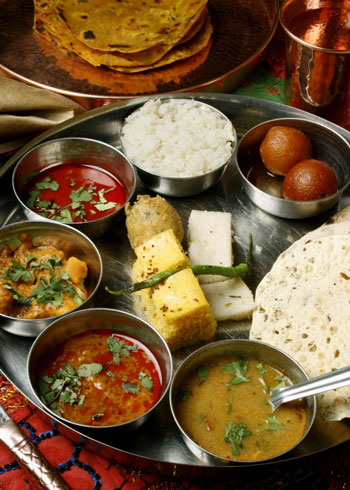-
In my role as Senior Trade Commissioner, South Asia with Austrade, I'm often asked for tips on working in the region and my answer is always the same: know the place. Get your feet on the ground. Be prepared to come to India. Come a lot.
And when you come, you have to be prepared to eat.
"India has become the fastest-growing major economy in the world in terms of its growth rate and ranked by E&Y as the most preferred destination for foreign direct investment."
Nicola Watkinson, Minister Commercial and Senior Trade & Investment Commissioner, South Asia at Austrade
You can't do business in India without eating. In India, almost as soon as you exchange business cards, people will invite you home to dinner. The reason they do that is they want to get to know you so they can decide if they want to do business with you.
People from western cultures may get a little uncomfortable with this but that's the way rapport is built between partners. No Indian encounter takes place without food.
It's a kind of encounter that is growing as trade between Australia and India ramps up. Two-way trade between Australia and India is now worth $A16 billion, and while that is
only 10 per cent of the two-way trade between Australia and China, it's growing.
Whilst Australia has had its sights fixed on China over the past two decades, India has become the fastest-growing major economy in the world in terms of its growth rate and found to be the most preferred destination for foreign direct investment in a recent E&Y survey.
International business is voting with its feet. They're saying it's time to come in and test the Indian market and that's a message we'd give to Australian businesses as well.
COMMON GROUND
Snacking beforehand is a must for an Indian dinner. Indians eat comparatively late compared with westerners. You'll be lucky if you're fed by 10.30pm in the evening.
Often you'll be invited over at 7pm for a few drinks. So westerners used to maybe one glass of wine before a meal, then relaxing and talking business after dessert will find in India, you relax and talk business, then you eat food.
As a result, I've seen many Australians worse for wear after two hours of politely sipping drinks, absolutely starved. So have a snack first. The little tips for doing business are not always the ones you expect.
For every difference through, there is much common ground. In India English is the main language of business, so there's no language challenge like many other Asian markets.
For Australia the similarities are great: a lot of institutions in India are familiar; the way bureaucracy works, the way the legal system operates. India has a mix of characteristics between a more western-style way of doing business and the more traditional Asian hierarchical, consensus decision-making style.
MAKING IT HAPPEN
Indian business negotiations can be very protracted but when a decision is made action can happen very quickly. That is very unique, at least within the Asian market.
Because Australian companies haven't been looking there for very long there are only about 100 odd groups really active in the Indian market. That's a minute fraction of what Australia has in traditional markets or China.
India's Modi government has launched a huge number of campaigns hoping to transform India into a cleaner, digital country with a strong local manufacturing scene, all aimed at increasing the country's economic competitiveness.
That's really where the opportunity for Australian business is in India, taking local solutions and technologies and bringing those to the Indian economy to help upskill and upscale business there.
One of the biggest misconceptions people have about India is because it's one country it's one market. India has over 15 official languages, let alone all the local dialects that exist. It's a heavily regionalised marketplace.
States have very high levels of autonomy. The regulatory environment in one state can be very different from the next. Companies interested in business in India need to ask “where is best state for me to find the right customers?" and then “where is the best state for me to do business?"
The Modi government's reform agenda is very ambitious. The challenge it faces is it doesn't have a majority in both houses of parliament. Its bid to push through legislation has been difficult.
But the approach it has taken is to say to the states “you have got a lot of autonomy, so if you want to do some of this stuff, we won't stand in the way." That's quite a different approach from previous central governments.
We are seeing change on a lot of the low-hanging fruit economic issues, although a lot of big-ticket reform items are probably going to have to wait until the next round of elections.
There are many things that make India quite unique. My motto after being in India nearly three years is “Nothing is easy, but everything is possible".
Nicola Watkinson is Minister Commercial and Senior Trade & Investment Commissioner, South Asia at Austrade. She was recently in Australia as part of the Women In Global Business series supported by ANZ.
The views and opinions expressed in this communication are those of the author and may not necessarily state or reflect those of ANZ.
EDITOR'S PICKS
-
At the ABWI, I heard one phrase repeated frequently: India has some key requirements and, for most, Australia has the resources and capability to meet and supply.
23 January 2015 -
Around the world chief financial officers are putting into place spending plans for 2015. In the Asia Pacific, companies in India lead the charge among major markets when it comes to a desire to invest.
10 April 2015 -
Following the Titanic disaster – the shipwreck not the movie – the global shipping industry and governments vowed to make sea travel safer.
4 August 2015
